A Comparative Review Essay: Dependency Theory and Neoliberalism
VerifiedAdded on 2023/05/28
|5
|961
|89
Essay
AI Summary
This essay provides a comparative analysis of dependency theory and neoliberalism as approaches to economic development. Dependency theory posits that wealthy nations enrich themselves by exploiting poorer, underdeveloped countries, while neoliberalism advocates for free trade, privatization, and reduced government spending to foster economic growth. The essay contrasts these theories across four main aspects: the nature of state policy, the usage of state power, foreign policy decision-making, and the determinants of foreign policy. Ultimately, the essay concludes that while both theories aim for state development, neoliberalism is presented as more beneficial, as it encourages growth in underdeveloped states rather than exploiting them. The differences between the two theories are evaluated, providing a comprehensive understanding of their contrasting viewpoints.
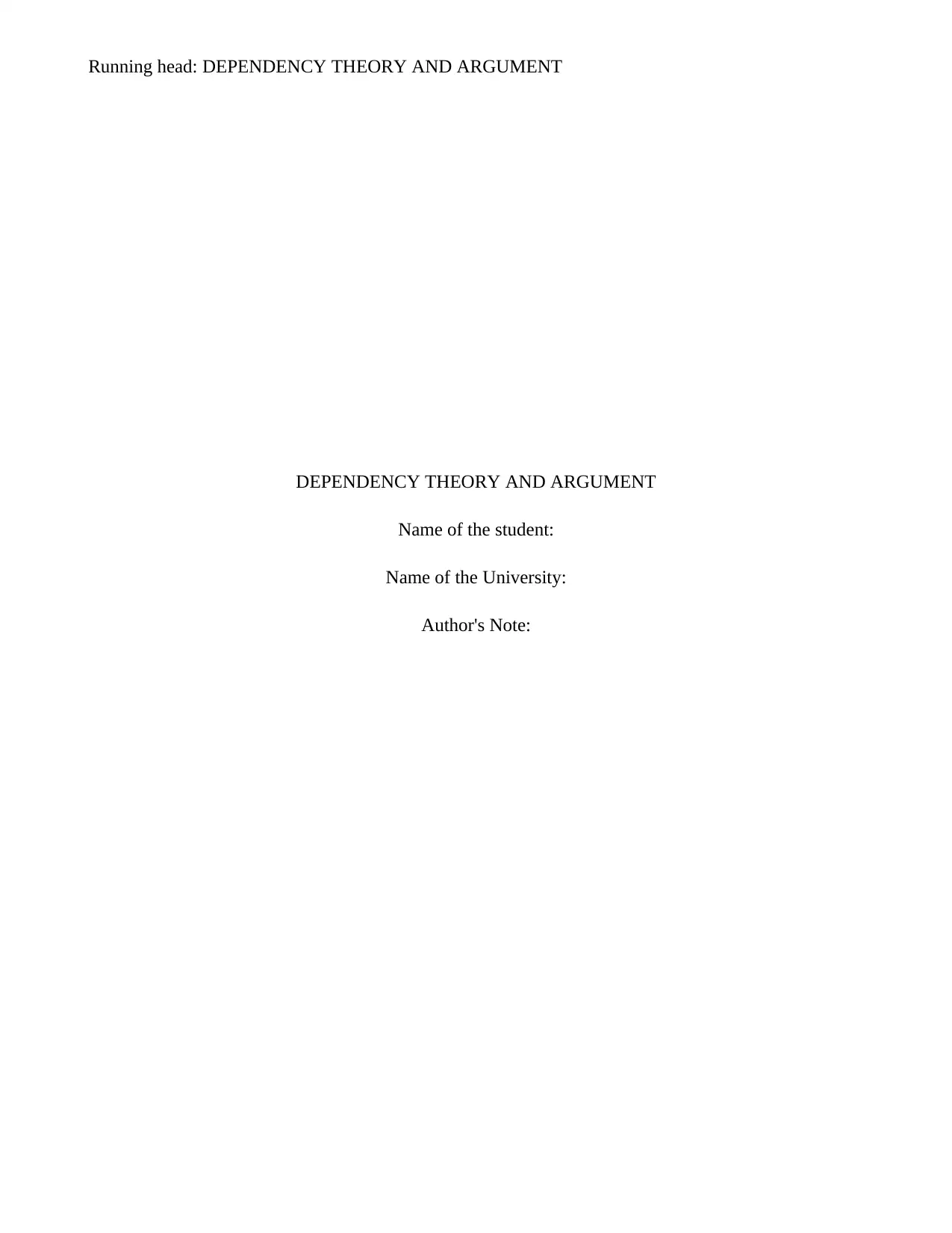
Running head: DEPENDENCY THEORY AND ARGUMENT
DEPENDENCY THEORY AND ARGUMENT
Name of the student:
Name of the University:
Author's Note:
DEPENDENCY THEORY AND ARGUMENT
Name of the student:
Name of the University:
Author's Note:
Paraphrase This Document
Need a fresh take? Get an instant paraphrase of this document with our AI Paraphraser
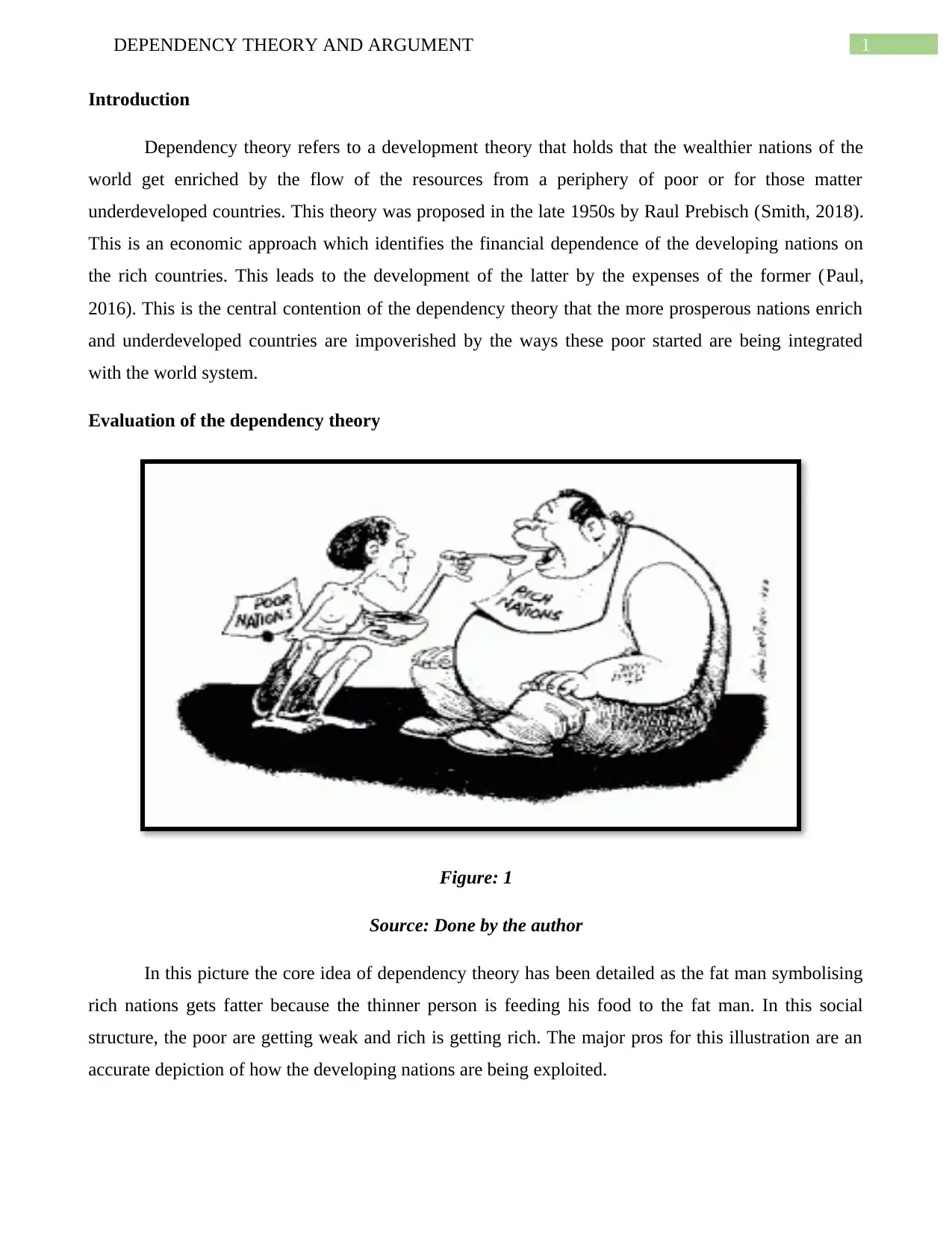
1DEPENDENCY THEORY AND ARGUMENT
Introduction
Dependency theory refers to a development theory that holds that the wealthier nations of the
world get enriched by the flow of the resources from a periphery of poor or for those matter
underdeveloped countries. This theory was proposed in the late 1950s by Raul Prebisch (Smith, 2018).
This is an economic approach which identifies the financial dependence of the developing nations on
the rich countries. This leads to the development of the latter by the expenses of the former (Paul,
2016). This is the central contention of the dependency theory that the more prosperous nations enrich
and underdeveloped countries are impoverished by the ways these poor started are being integrated
with the world system.
Evaluation of the dependency theory
Figure: 1
Source: Done by the author
In this picture the core idea of dependency theory has been detailed as the fat man symbolising
rich nations gets fatter because the thinner person is feeding his food to the fat man. In this social
structure, the poor are getting weak and rich is getting rich. The major pros for this illustration are an
accurate depiction of how the developing nations are being exploited.
Introduction
Dependency theory refers to a development theory that holds that the wealthier nations of the
world get enriched by the flow of the resources from a periphery of poor or for those matter
underdeveloped countries. This theory was proposed in the late 1950s by Raul Prebisch (Smith, 2018).
This is an economic approach which identifies the financial dependence of the developing nations on
the rich countries. This leads to the development of the latter by the expenses of the former (Paul,
2016). This is the central contention of the dependency theory that the more prosperous nations enrich
and underdeveloped countries are impoverished by the ways these poor started are being integrated
with the world system.
Evaluation of the dependency theory
Figure: 1
Source: Done by the author
In this picture the core idea of dependency theory has been detailed as the fat man symbolising
rich nations gets fatter because the thinner person is feeding his food to the fat man. In this social
structure, the poor are getting weak and rich is getting rich. The major pros for this illustration are an
accurate depiction of how the developing nations are being exploited.
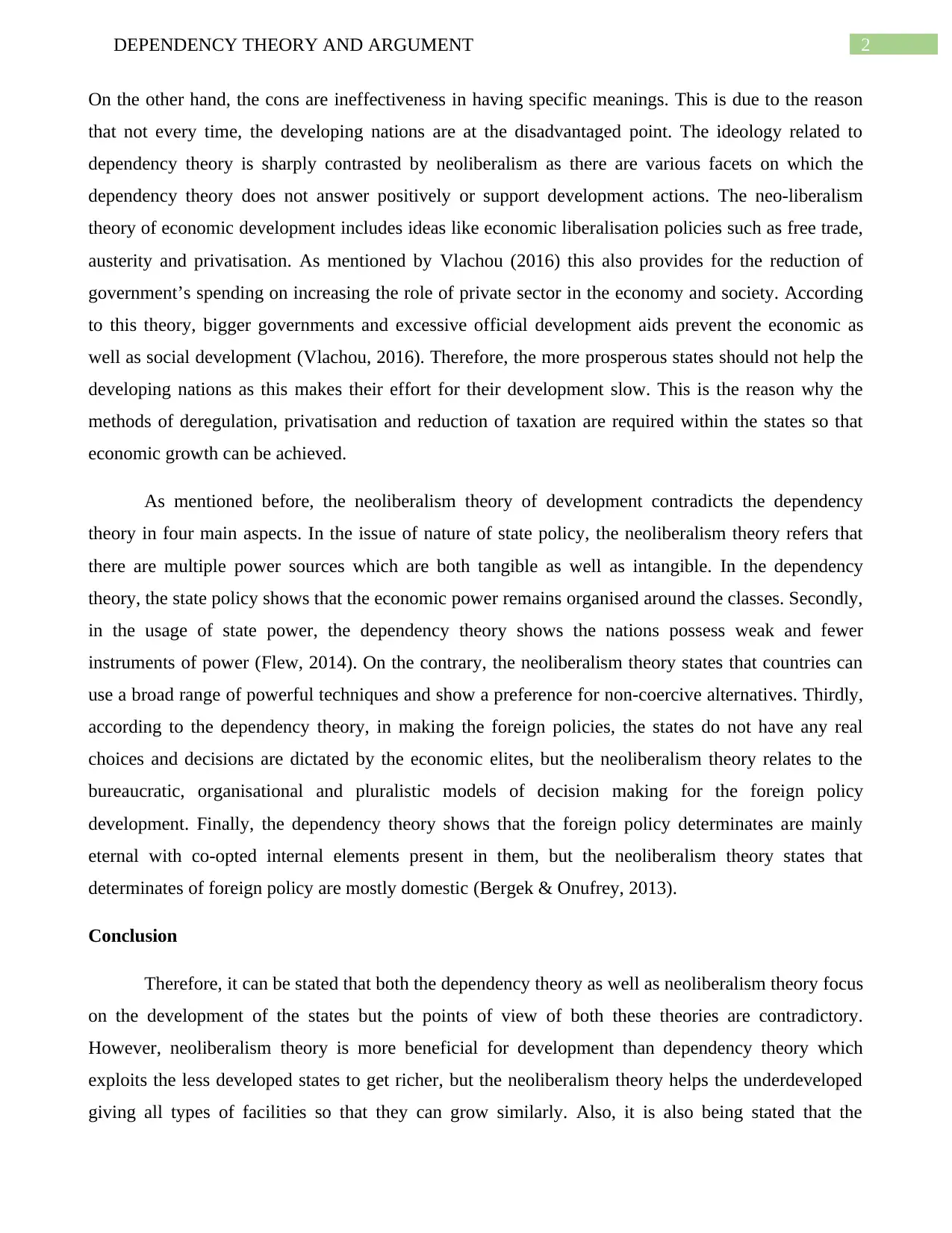
2DEPENDENCY THEORY AND ARGUMENT
On the other hand, the cons are ineffectiveness in having specific meanings. This is due to the reason
that not every time, the developing nations are at the disadvantaged point. The ideology related to
dependency theory is sharply contrasted by neoliberalism as there are various facets on which the
dependency theory does not answer positively or support development actions. The neo-liberalism
theory of economic development includes ideas like economic liberalisation policies such as free trade,
austerity and privatisation. As mentioned by Vlachou (2016) this also provides for the reduction of
government’s spending on increasing the role of private sector in the economy and society. According
to this theory, bigger governments and excessive official development aids prevent the economic as
well as social development (Vlachou, 2016). Therefore, the more prosperous states should not help the
developing nations as this makes their effort for their development slow. This is the reason why the
methods of deregulation, privatisation and reduction of taxation are required within the states so that
economic growth can be achieved.
As mentioned before, the neoliberalism theory of development contradicts the dependency
theory in four main aspects. In the issue of nature of state policy, the neoliberalism theory refers that
there are multiple power sources which are both tangible as well as intangible. In the dependency
theory, the state policy shows that the economic power remains organised around the classes. Secondly,
in the usage of state power, the dependency theory shows the nations possess weak and fewer
instruments of power (Flew, 2014). On the contrary, the neoliberalism theory states that countries can
use a broad range of powerful techniques and show a preference for non-coercive alternatives. Thirdly,
according to the dependency theory, in making the foreign policies, the states do not have any real
choices and decisions are dictated by the economic elites, but the neoliberalism theory relates to the
bureaucratic, organisational and pluralistic models of decision making for the foreign policy
development. Finally, the dependency theory shows that the foreign policy determinates are mainly
eternal with co-opted internal elements present in them, but the neoliberalism theory states that
determinates of foreign policy are mostly domestic (Bergek & Onufrey, 2013).
Conclusion
Therefore, it can be stated that both the dependency theory as well as neoliberalism theory focus
on the development of the states but the points of view of both these theories are contradictory.
However, neoliberalism theory is more beneficial for development than dependency theory which
exploits the less developed states to get richer, but the neoliberalism theory helps the underdeveloped
giving all types of facilities so that they can grow similarly. Also, it is also being stated that the
On the other hand, the cons are ineffectiveness in having specific meanings. This is due to the reason
that not every time, the developing nations are at the disadvantaged point. The ideology related to
dependency theory is sharply contrasted by neoliberalism as there are various facets on which the
dependency theory does not answer positively or support development actions. The neo-liberalism
theory of economic development includes ideas like economic liberalisation policies such as free trade,
austerity and privatisation. As mentioned by Vlachou (2016) this also provides for the reduction of
government’s spending on increasing the role of private sector in the economy and society. According
to this theory, bigger governments and excessive official development aids prevent the economic as
well as social development (Vlachou, 2016). Therefore, the more prosperous states should not help the
developing nations as this makes their effort for their development slow. This is the reason why the
methods of deregulation, privatisation and reduction of taxation are required within the states so that
economic growth can be achieved.
As mentioned before, the neoliberalism theory of development contradicts the dependency
theory in four main aspects. In the issue of nature of state policy, the neoliberalism theory refers that
there are multiple power sources which are both tangible as well as intangible. In the dependency
theory, the state policy shows that the economic power remains organised around the classes. Secondly,
in the usage of state power, the dependency theory shows the nations possess weak and fewer
instruments of power (Flew, 2014). On the contrary, the neoliberalism theory states that countries can
use a broad range of powerful techniques and show a preference for non-coercive alternatives. Thirdly,
according to the dependency theory, in making the foreign policies, the states do not have any real
choices and decisions are dictated by the economic elites, but the neoliberalism theory relates to the
bureaucratic, organisational and pluralistic models of decision making for the foreign policy
development. Finally, the dependency theory shows that the foreign policy determinates are mainly
eternal with co-opted internal elements present in them, but the neoliberalism theory states that
determinates of foreign policy are mostly domestic (Bergek & Onufrey, 2013).
Conclusion
Therefore, it can be stated that both the dependency theory as well as neoliberalism theory focus
on the development of the states but the points of view of both these theories are contradictory.
However, neoliberalism theory is more beneficial for development than dependency theory which
exploits the less developed states to get richer, but the neoliberalism theory helps the underdeveloped
giving all types of facilities so that they can grow similarly. Also, it is also being stated that the
⊘ This is a preview!⊘
Do you want full access?
Subscribe today to unlock all pages.

Trusted by 1+ million students worldwide
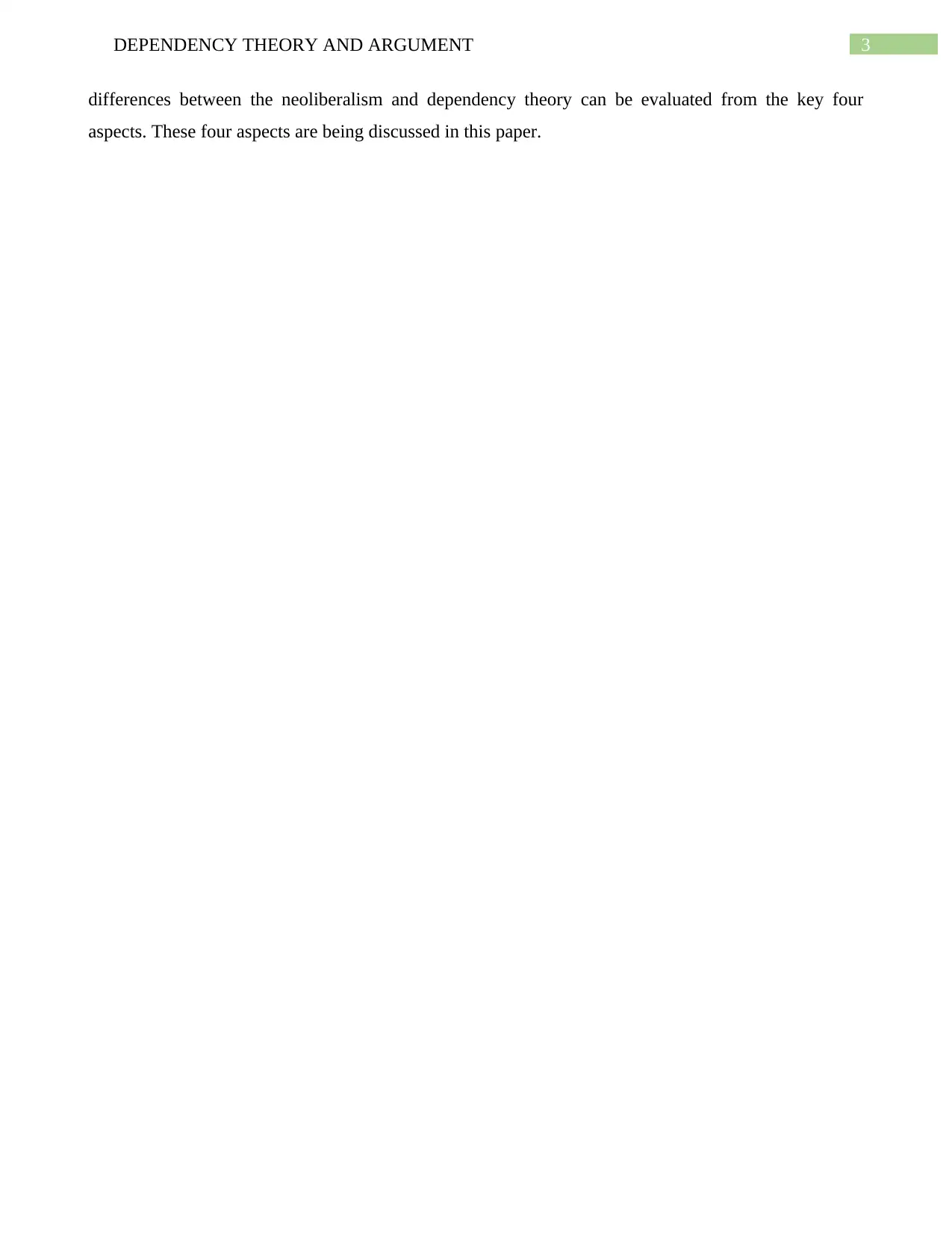
3DEPENDENCY THEORY AND ARGUMENT
differences between the neoliberalism and dependency theory can be evaluated from the key four
aspects. These four aspects are being discussed in this paper.
differences between the neoliberalism and dependency theory can be evaluated from the key four
aspects. These four aspects are being discussed in this paper.
Paraphrase This Document
Need a fresh take? Get an instant paraphrase of this document with our AI Paraphraser
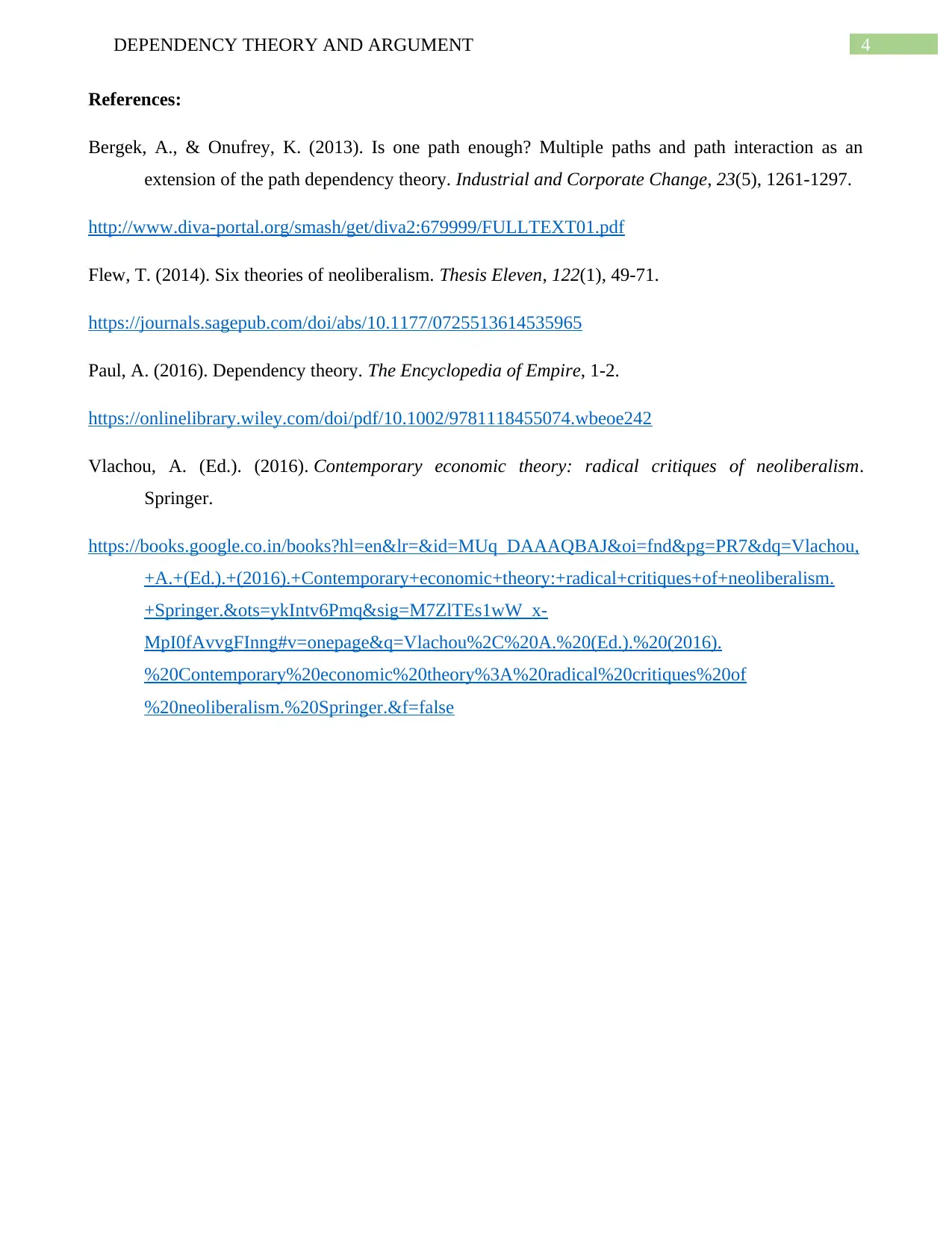
4DEPENDENCY THEORY AND ARGUMENT
References:
Bergek, A., & Onufrey, K. (2013). Is one path enough? Multiple paths and path interaction as an
extension of the path dependency theory. Industrial and Corporate Change, 23(5), 1261-1297.
http://www.diva-portal.org/smash/get/diva2:679999/FULLTEXT01.pdf
Flew, T. (2014). Six theories of neoliberalism. Thesis Eleven, 122(1), 49-71.
https://journals.sagepub.com/doi/abs/10.1177/0725513614535965
Paul, A. (2016). Dependency theory. The Encyclopedia of Empire, 1-2.
https://onlinelibrary.wiley.com/doi/pdf/10.1002/9781118455074.wbeoe242
Vlachou, A. (Ed.). (2016). Contemporary economic theory: radical critiques of neoliberalism.
Springer.
https://books.google.co.in/books?hl=en&lr=&id=MUq_DAAAQBAJ&oi=fnd&pg=PR7&dq=Vlachou,
+A.+(Ed.).+(2016).+Contemporary+economic+theory:+radical+critiques+of+neoliberalism.
+Springer.&ots=ykIntv6Pmq&sig=M7ZlTEs1wW_x-
MpI0fAvvgFInng#v=onepage&q=Vlachou%2C%20A.%20(Ed.).%20(2016).
%20Contemporary%20economic%20theory%3A%20radical%20critiques%20of
%20neoliberalism.%20Springer.&f=false
References:
Bergek, A., & Onufrey, K. (2013). Is one path enough? Multiple paths and path interaction as an
extension of the path dependency theory. Industrial and Corporate Change, 23(5), 1261-1297.
http://www.diva-portal.org/smash/get/diva2:679999/FULLTEXT01.pdf
Flew, T. (2014). Six theories of neoliberalism. Thesis Eleven, 122(1), 49-71.
https://journals.sagepub.com/doi/abs/10.1177/0725513614535965
Paul, A. (2016). Dependency theory. The Encyclopedia of Empire, 1-2.
https://onlinelibrary.wiley.com/doi/pdf/10.1002/9781118455074.wbeoe242
Vlachou, A. (Ed.). (2016). Contemporary economic theory: radical critiques of neoliberalism.
Springer.
https://books.google.co.in/books?hl=en&lr=&id=MUq_DAAAQBAJ&oi=fnd&pg=PR7&dq=Vlachou,
+A.+(Ed.).+(2016).+Contemporary+economic+theory:+radical+critiques+of+neoliberalism.
+Springer.&ots=ykIntv6Pmq&sig=M7ZlTEs1wW_x-
MpI0fAvvgFInng#v=onepage&q=Vlachou%2C%20A.%20(Ed.).%20(2016).
%20Contemporary%20economic%20theory%3A%20radical%20critiques%20of
%20neoliberalism.%20Springer.&f=false
1 out of 5
Related Documents
Your All-in-One AI-Powered Toolkit for Academic Success.
+13062052269
info@desklib.com
Available 24*7 on WhatsApp / Email
![[object Object]](/_next/static/media/star-bottom.7253800d.svg)
Unlock your academic potential
Copyright © 2020–2025 A2Z Services. All Rights Reserved. Developed and managed by ZUCOL.





